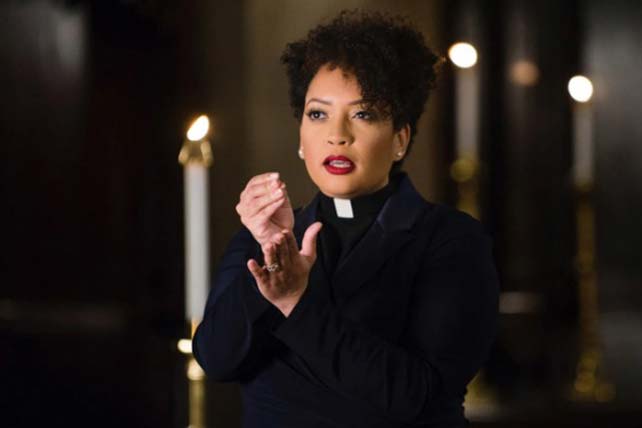(RNS) — A New York pastor and immigrant rights activist has won a protracted legal battle against the U.S. Department of Homeland Security, with a judge ruling last week that federal agents violated her religious freedom and retaliated against her following a 2019 incident along the U.S.-Mexico border.
In his ruling, U.S. District Judge Todd W. Robinson said the Rev. Kaji Douša had established that the U.S. Customs and Border Protection had “unlawfully retaliated against her for her protected First Amendment activity, violated her Free Exercise right to minister to migrants in Mexico, and violated” the 1993 Religious Freedom Restoration Act.
Douša, the senior pastor of Park Avenue Christian Church, celebrated the ruling in a statement to Religion News Service on Monday (March 27).
“I am overwhelmed with gratitude for Judge Robinson’s sound, fair and just ruling,” Douša said. “The government’s approach — stalling, gaslighting, even lying — was entirely unconvincing to the court, and I am thrilled for the vindication. Judge Robinson cleared my name, and I thank God for it.”
RELATED: US Targets Russian Mercenary Group Over Religious Freedom
The case dates back to January 2019, under former President Donald Trump’s administration, when Douša was stopped and questioned for roughly an hour and a half by federal agents while crossing from Tijuana, Mexico, back into the U.S. Douša had been participating in a 40-day “Sanctuary Caravan” assisting Central American asylum-seekers on the Mexican side of the border, one of several similar faith-based efforts at the time designed to aid migrants.
Two months later, a San Diego NBC affiliate published documents from a secret U.S. government database of activists, journalists and others connected to the migrant caravan that showcased, among other things, Douša’s name and photo with a yellow “X” across her face. The documents suggested the pastor’s SENTRI pass — which allows for expedited screening along the Southwest U.S.-Mexico border — had been revoked.
Douša eventually sued the government, kicking off a lengthy trial that stretched more than three and a half years. Additional documents unearthed over the course of the lawsuit revealed evidence the U.S. government surveilled and investigated Douša for her activism, at one point tying her to Antifa.
“To be honest I don’t even know what antifa is,” Douša said in 2020 when RNS asked her about the designation.
The government’s actions appeared to focus on marriages performed for asylum-seekers by Douša while she visited the caravan, although the pastor noted in a brief that she made no promises and “no representations regarding the legal impact our religious ceremonies would have in any application for asylum” and pointed to a document she helped create that encouraged clergy to “make sure the people understand it is a religious ceremony and certificate.”
What’s more, Douša and her lawyers accused the government of targeting her “because she engaged in ‘acts of devotion commanded by the core tenets of her Christian faith’ — namely, advocating for and ministering to migrants in New York and at the Southern Border by blessing their marriages, dedicating their children to Christ, hearing their confessions, and providing them other forms of pastoral care.”
Such actions, Douša and her lawyers argued, are protected under the Constitution and the 1993 Religious Freedom Restoration Act.
Judge Robinson ultimately reached a similar conclusion, noting that other documents revealed during the case included a December 2018 email from a U.S. Customs and Border Patrol official to Mexican authorities. The communique asked Mexican officials to bar more than a dozen U.S. citizens from entering the country — including Douša — insisting they “lack(ed) the proper documentation to be in Mexico.”
In his ruling, Robinson noted CBP officials admitted the email was “creative writing” without “any basis,” and concluded the government had violated Douša’s right to freely exercise her religion as well as her rights under the Religious Freedom Restoration Act by “restricting her ability to minister to migrants in Mexico.”
The pastor received support from her fellow faith leaders throughout the lawsuit, with a coalition of more than 850 ordained clergy from around North America signing a letter in support of Douša in 2019. Her denomination, the United Church of Christ, also issued a statement of support, calling the government’s actions “abusive assertions of political power.”
This article originally appeared here.

